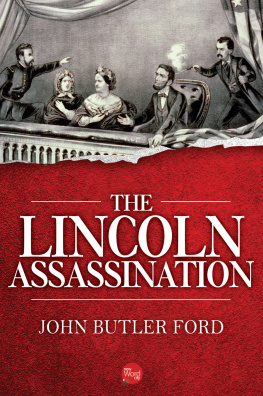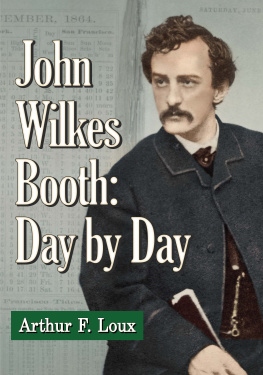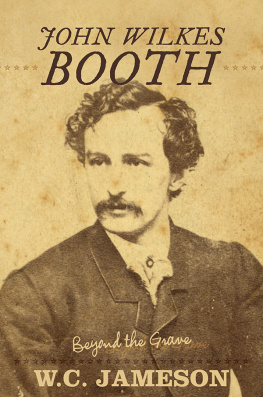

THE BITTER RIVALRY BETWEEN EDWIN
AND JOHN WILKES BOOTH
THAT LED TO AN AMERICAN TRAGEDY


Free Press
A Division of Simon & Schuster, Inc.
1230 Avenue of the Americas
New York, NY 10020
www.SimonandSchuster.com
Copyright 2010 by Nora Titone
All rights reserved, including the right to reproduce this book or portions thereof in any form whatsoever. For information address Free Press Subsidiary Rights Department, 1230 Avenue of the Americas, New York, NY 10020.
First Free Press hardcover edition October 2010
FREE PRESS and colophon are trademarks of Simon & Schuster, Inc.
For information about special discounts for bulk purchases, please contact Simon & Schuster Special Sales at 1-866-506-1949 or business@simonandschuster.com.
The Simon & Schuster Speakers Bureau can bring authors to your live event. For more information or to book an event contact the Simon & Schuster Speakers Bureau at 1-866-248-3049 or visit our website at www.simonspeakers.com.
Designed by Akasha Archer
Manufactured in the United States of America
10 9 8 7 6 5 4 3 2 1
Library of Congress Cataloging-in-Publication Data
Titone, Nora.
My thoughts be bloody: the bitter rivalry between Edwin and John Wilkes Booth that led to an American tragedy / by Nora Titone; foreword by Doris Kearns Goodwin.1st Free Press hardcover ed.
p. cm.
Includes bibliographical references and index.
1. Booth, John Wilkes, 18381865. 2. Booth, John Wilkes, 18381865Family. 3. Booth, Edwin Gilliam, 18101886. 4. AssassinsUnited StatesBiography. 5. ActorsUnited StatesBiography. 6. BrothersUnited StatesBiography. 7. Lincoln, Abraham, 18091865Assassination. 8. Sibling rivalryUnited StatesCase studies. I. Title.
E457.5.T57 2010
973.7092dc22
[B]
2010034297
ISBN 978-1-4165-8605-0
ISBN 978-1-4165-8616-6 (ebook)
For Jason and Nick
Let me lament,
With tears as sovereign as the blood of hearts,
That thou, my brother, my competitor
In top of all design, my mate in empire,
Friend and companion in the front of war,
The arm of mine own body, and the heart
Where mine his thoughts did kindle,that our stars,
Unreconcilable, should divide
Our equalness to this.
Antony and Cleopatra, 5.1
How all occasions do inform against me
And spur my dull revenge!
O, from this time forth,
My thoughts be bloody, or be nothing worth!
Hamlet, 4.4
For Jason and Nick
CONTENTS
 PART ONE
PART ONE
18211852
 PART TWO
PART TWO
18531860
 PART THREE
PART THREE
18611865
FOREWORD
Filled with ambition, rivalry, betrayal, and tragedy, this story of the celebrated Shakespearean actor Junius Brutus Booth and the two sons, Edwin and John Wilkes, who competed to wear his crown, is as gripping as a fine work of fiction. Yet, given the role that the younger son played in murdering President Abraham Lincoln, My Thoughts Be Bloody is simultaneously an important work of historythe best account I have ever read of the complex forces that led John Wilkes Booth to carry a gun into Fords Theatre on April 14, 1865.
Spanning nearly three-quarters of a century, the book carries us back to early nineteenth-century London, where Junius Booth, handsome, tormented, and brilliant, is the toast of the town. Married with a small child, he falls in love with nineteen-year-old Mary Ann Holmes. Abandoning his family, he flees with his mistress to America, where he begins a new family and becomes a towering star, traveling from one city to the next, delivering passionate performances of Richard III, Hamlet, and King Lear.
Early on, Nora Titone convincingly argues, two of Juniuss four surviving sons give promise of following in their fathers footsteps. But which of the two would succeedthe more intelligent, sensitive Edwin or the handsomer, more aggressive John Wilkesis unclear. When Junius chooses the older son, Edwin, to accompany him on the road, a fierce jealousy begins to fester in John Wilkes. Though Edwin finds traveling with his hard-drinking father difficult, he begins to experience the magic of the theater. On his own, he memorizes long passages from Shakespeare; he absorbs his fathers gestures, accents, and facial expressions. He hungers for the fame his father has achieved.
Edwins chance comes when Junius suddenly dies. As throngs of mourners gather for the funeral procession, the nineteen-year-old Edwin assumes his fathers mantle and soon becomes a greater star than Junius ever was. In contrast to his fathers bombastic style, he mesmerizes audiences with the naturalness of his performances and his conversational tone. Critics rate his first performance as Richard III a blaze of genius. Moving from one triumph to another, he becomes a wealthy man when still in his early twenties.
When John Wilkes comes of age, he too becomes an actor. His handsome features and well-proportioned body hold promise, but he possesses neither the talent nor the discipline to become a star. Edwin fears that his brother will dilute the family name and that two Booths on the same circuit will cut into his profits, even though he is, by far, the better known. He has power to wield, however, so he divides the United States into two regions. Each brother would perform in his own region, never crossing into the others territory. Edwin takes the populous North, including New York City, Boston, and Philadelphia, while John Wilkes is relegated to the less populous South, where audiences and profits are much smaller. John Wilkes begins his first Southern tour in 1860, as the country itself is dividing along the same lines as his brothers map.
Toiling in the South, John Wilkes begins to sympathize with the Confederate cause, increasing tensions with his Union-loving family. After performing in New Orleans, where he meets up with members of the Confederate Secret Service, John Wilkes finally finds his chance for stardom by joining the conspiracy to kidnap President Lincoln. His decision, Titone persuasively argues, is forged as much by his failed career, his squandered earnings, and his jealousy of his brothers success, as by his politics or his hatred for Lincoln.
Next page







 PART ONE
PART ONE